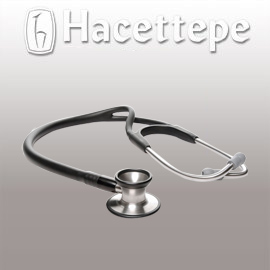Hacettepe University Faculty of Medicine
Department of Ophthalmology

Ophthalmology Department was founded by Prof. Salih Behiç in 1963 in Hacettepe Children’s Hospital. Department of Ophthalmology is located on floor B in Hacettepe Adult Hospital. Academic staff, instructors, technicians and nurses give service for diagnosis and treatment of diseases that affect the eye and surrounding tissues, which can develop in every stage of life from newborns to geriatric patient groups.

Diagnosis and treatment services for diseases associated with eyes, eyelids and surrounding tissues are provided to patients of any age. 3 computers which determine refractive disorders (myopia, hypermetropia and astigmatism), color vision tests (Ishiara and Lhantony), devices measuring intraocular pressure, computer (Humphrey) vision field analyzer, eye surface topographer, ocular biometry device, fundus camera and angiography device (fluorescein and indocyanine green), electroretinography (ERG) and electrooculography (EOG) devices, visual evoked potential (VEP) testing device, ocular ultrasound and optic coherence tomography devices are available in the department. YAG, argon ve diode lasers for therapeutic purposes and a specific laser for photodynamic treatment are available as well. 2 operating rooms provide service for surgery. 2 facuemulsion (cataract treatment with ultrasound) devices, 1 vitrectomy device, diode and argon lasers and an excimer laser device which provides laser treatment of refractive disorders (LASIK, LASEK) are available.
Outpatient Clinic of Ophthalmology consists of 7 examination rooms. Room no. 7 is reserved for immediate evaluation of emergency cases (such as accidents, foreign objects in the eye, sudden vision losses).
Diagnosis and treatment services for any type of general eye diseases are provided in the department. When necessary, opinion is requested from the relevant sub-unit for an elaborated examination. These sub-units are:
Patients with glaucoma, also known as intraocular pressure, are monitored in this unit. The unit is equipped with the state of art technology such as tonometers used for intraocular pressure measurement, visual field analyzers using computer-assisted and manual instrumentation and retinal nerve fiber layer thickness measurement with optic coherence tomography. Patients should apply to the outpatient clinic to receive service from the unit.
Advanced diagnoses and treatments of diseases associated with cornea, the clear outer layer at the front of the eyeball, are given in this unit. Topographers for precise measurement of cornea, corneal thickness measurement devices, specular microscopy and keratometers for measuring cornea’s refractive power and corneal radius are available in the unit. The unit deals with refractive surgery (correcting refractive disorders with surgical or laser methods). Refractive disorders of healthy individuals who do not want to use glasses or contact lens are corrected with excimer laser. Another field of activity of the unit comprises of contact lenses. The unit is involved in selecting and testing appropriate contact lens as well as informing patients with correct usage and having them practice. Patients should apply to the outpatient clinic to receive service from the unit.
All types of malignant and benign tumors in the eyelids, eye surface as well as intraocular or orbital (structure containing the globe) tumors are diagnosed and treated in the unit. Fine needle aspiration biopsy and ocular ultrasonography are among the diagnostic methods applied. Laser options such as argon, diode (TTT) and photodynamic therapy are offered in the unit. Furthermore, suitable patients can be recommended Iodine-125 plaque therapy. The treatment is mainly addressed at retinoblastoma and melanoma patients. Apart from these, all types of surgical methods are practiced for tumor removal. Patients should apply to the outpatient clinic to receive service from the unit.
Congenital deformities affecting eyelids and the surrounding area, deformities caused by accidents, masses large enough to cause visual issues as well as various cosmetic problems developing with old age are addressed and corrected in the department. All types of eyelid hang-up surgeries (for drooping eyelids), blepharoplasties, grafting methods as well as recreation of lower and upper eyelid are among the services offered. Patients should apply to the outpatient clinic to receive service from the unit.
The majority of patients treated in this unit are pediatric or adult patients with strabismus. Amblyopia is treated with various methods. Furthermore, treatment is offered for childhood cataracts, intraocular pressure and various congenital abnormalities. Botulinum toxin is also used for the treatment of certain strabismus types. Patients should apply to the outpatient clinic to receive service from the unit.
All types of retina diseases (retinal detachment, vascular diseases, conditions associated with diabetes) are treated with medical and surgical methods. Prematurity retinopathy, a disease which occurs in premature births and very low birth weight infants can be treated with cyrotherapy or diode laser. Intraocular inflammation (uveit) is diagnosed, treated and followed. The relevant units of our hospital work in collaboration for Behcet’s disease. In addition to conventional laser therapies, photodynamic therapy (PDT) has also been initiated for age-related macular degeneration treatment. All types of vitrectomy, decolman surgery and silicon oil injection are performed. Patients should apply to the outpatient clinic to receive service from the unit.
Patients should apply to outpatient secretariat on floor B or dial 444 4 444 to receive appointment on any weekday for eye and vision examination. Patient should apply with the original copy of ID card and, if any, official referral paper for examination upon receiving appointment. Patients in need of surgical intervention can receive surgery appointment at the end of examination.
Department of Ophthalmology and the outpatient clinic are located on floor B (2 floors below the ground floor) in Hacettepe Adult Hospital. The inpatient services are located in ward 42 on the 2nd floor. Eye surgeries are performed in the common operating room department located on floor A.
Telephone
+90 (312) 305 17 75 (Secretary Office of the Policlinic)
+90 (312) 305 17 76 (Secretary Office of the Policlinic)
+90 (312) 305 17 77 (Secretary Office of the Department)
+90 (312) 305 17 78 (Secretary Office of the Department)













